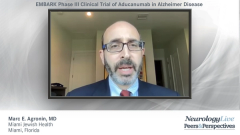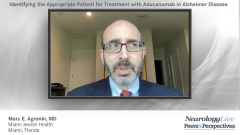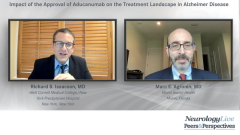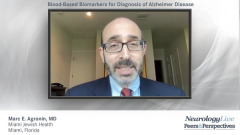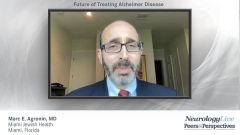
Impact of the Approval of Aducanumab on the Treatment Landscape in Alzheimer Disease
Impact of the approval of aducanumab on the treatment landscape and other drugs in development for the treatment of Alzheimer disease.
Episodes in this series

Richard Isaacson, MD: We've talked a lot about aducanumab. What does this do for the rest of the field? How does this impact the treatment landscape of Alzheimer's disease and what about all these other drugs in development? We talked about lecanemab, which is being studied for both early Alzheimer's disease, dementia, mild cognitive, and impairment being studied in large phase 3 studies. We have a galantamine, for example, that's a recent made a big splash a few months ago. Donanemab showed some interesting results too. Fast forwarding, after that New England Journal [of Medicine] paper, there is going to be phase 3 study launching all over now. Here we go again, another antibody has potential, it failed in 1 way but maybe positive in other patients and other subgroups? How do you think this approval affects those studies which you mentioned before where people may not want to enroll? Do you think that increases the likelihood of success that the FDA will look at these data and say, "We don't need a cognitive measure because, on label, there's no cognitive anything in the label for aducanumab. It's a biomarker-based disease". Do you think these additional anti-amyloid agents are going to have a higher likelihood of success based on the precedent that the FDA has now seen?
Marc E. Agronin, MD: Yes, and I would throw into the mix anti-tau treatments also that are being looked at. Yes, so this is 1 question that's been raised is, given the FDA's approach here, is this going to set a precedent for the change the bar in terms of other treatments? I've been to some FDA review committees and it's a tough environment for any treatment for Alzheimer's disease. Almost everything has failed through it and with good reason, either the data is there or it's not there. We need data and we need studies. If someone is presented with a 2-year on average, placebo-controlled trial of some other immunotherapy or any other Alzheimer's treatment. I would add to that that the screening process is very rigorous. I have some studies where it's a 2 or 3-month process of multiple scans, multiple scales, and someone is asking themselves, "Am I going to go through that process for 2 years that to be on potential placebo? I can walk down the street and get this infusion.”
It's going to be an issue and so one question I raise is do we need to change the scope of some clinical trials? Do they need to be shorter? Do they need to get into more quickly open-label? Do we need to make aducanumab a comparator? I don't have answers to these questions, but there's no question as a researcher, and I'm certain any company working on clinical trials, any researcher trying to generate a clinical trial is going to have to think about this in terms of what they're competing with. I'm concerned about its impact on research. I know a lot of people are. Again, it's an issue that is yet to be determined. My sense is, I'm trying to be very optimistic here, is that I think this is going to be a very gradual rollout. I think what we're going to see both from clinicians and payers, is that there's going to be a pretty high bar to qualify for the treatment to get payment for it. Sure, some people are going to walk in and just want to pay cash for this. I don't think that's going to be the majority. I think that will be few and far between, so I think it's going to be done in a very measured way. At least, I hope it is, and this is part of the reason we're talking about this because I think you know these questions really have to be vetted and discussed on every level. There is some consensus because we've seen some of the controversy, we've seen some of the concerns raised amongst colleagues. I think in general, it's better when people are on the same page when we agree on what the best approach is. We want consensus at the end of the day.
Richard Isaacson, MD: Yep, I agree, and I completely agree with all of your points. Patients do what they want to do and it even opens up the door to what if someone is on aducanumab, they're in another clinical trial and it could be mixing so there's lots of potential issues there that we need to have very frank conversations with patients about. I think that happening is going to be very few and far between, at least I hope it would be. However, there's actually studies being planned for that now. Obviously, if you're on an anti-amyloid drug in a clinical trial, you really should not be on the anti-amyloid drug in practice, that’s easy. But what about an anti-tau drug in clinical trial, but being on the amyloid drug in front? That probably mixes things up and confuses things, but, for example, there's a phase 3 study. It's going to enroll over 3,700 people with semaglutide.
Semaglutide is a GLP-1 drug. It's basically a diabetes drug that's been studied and has some interesting outcomes with cognition and Alzheimer's disease. Basically, they're going to be evaluating whether semaglutide for a 2-year trial, can slow Alzheimer's progression, and actually improve cognitive function. That study to my understanding, I think I probably need to double-check this, but it allows someone to be an anti-amyloid drug. There may be some studies that people could go into and participate in as well as being on aducanumab. How do you track that? How do you analyze for that? Obviously, it's a randomized trial so hopefully, some of that will shake out but it really adds just a whole another level of I guess statistical complexity, real-world complexity, recruitment complexity, when you have a drug like this available in the market.
Marc E. Agronin, MD: We have people on acetylcholinesterase inhibitors and memantine who are in trials that we know has a potential to affect to confound the data to some extent. You're right, it may be that it becomes an acceptable treatment. I'm seeing over time; I would say across the board for not just Alzheimer's studies but other clinical trials, are a greater and greater allowance for other modalities being used simultaneously. Obviously, someone can't be on more than 1 clinical trial at the same time but I think realistically, your point is probably going to become more the reality that either the studies allow these other treatments or they're really going to have a hard time enrolling.
Richard Isaacson, MD: I totally agree.
Marc E. Agronin, MD: You also point out how important it is in addition to immunotherapy to look at these other modalities and other ways to try to get at this disease. As much as we know that the data, that the FDA based approval on and this aducanumab. What we're imagining we'll see with other immunotherapies is that it can rid the brain of amyloid, that there's the potential to slow to the disease course down. We clearly need more than that, we need better than that, and we don't want to compromise studies that are looking at other modalities and other ways to get at this disease. That's critically important.
Richard Isaacson, MD: Dr Agronin, thanks so much.
Marc E. Agronin, MD: Thank you. My pleasure.
Transcript Edited for Clarity
Newsletter
Keep your finger on the pulse of neurology—subscribe to NeurologyLive for expert interviews, new data, and breakthrough treatment updates.

